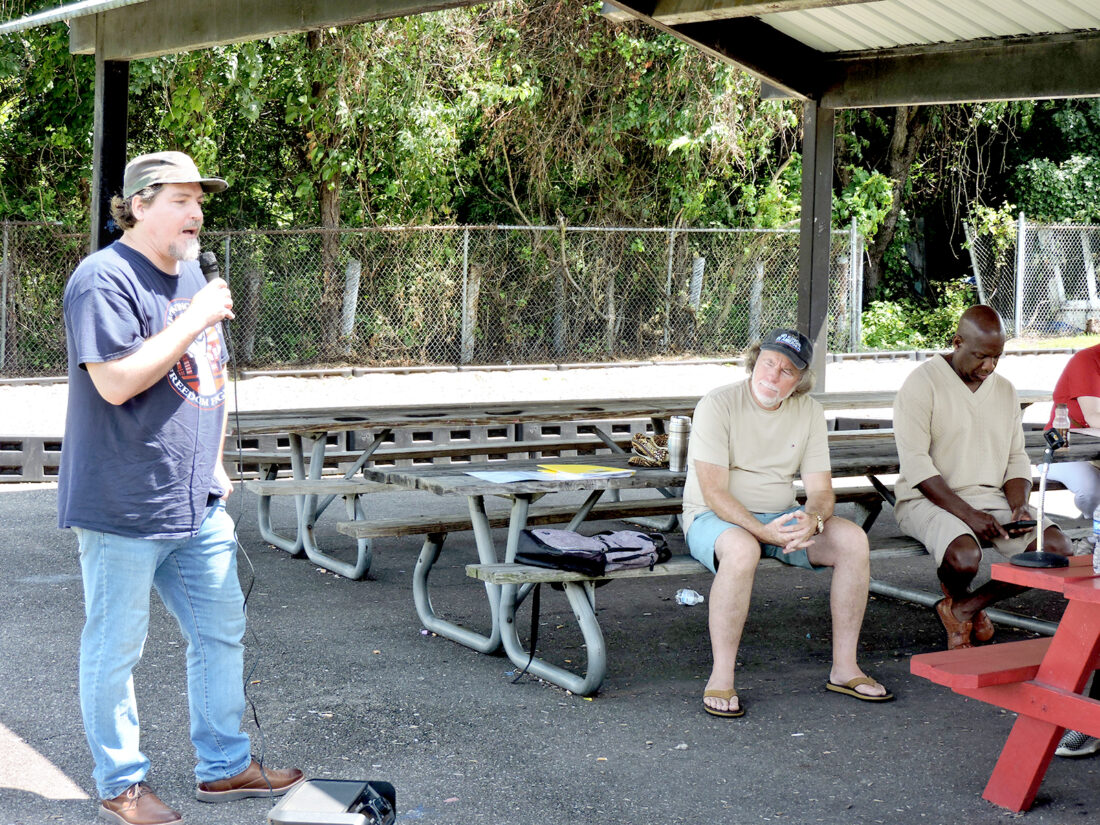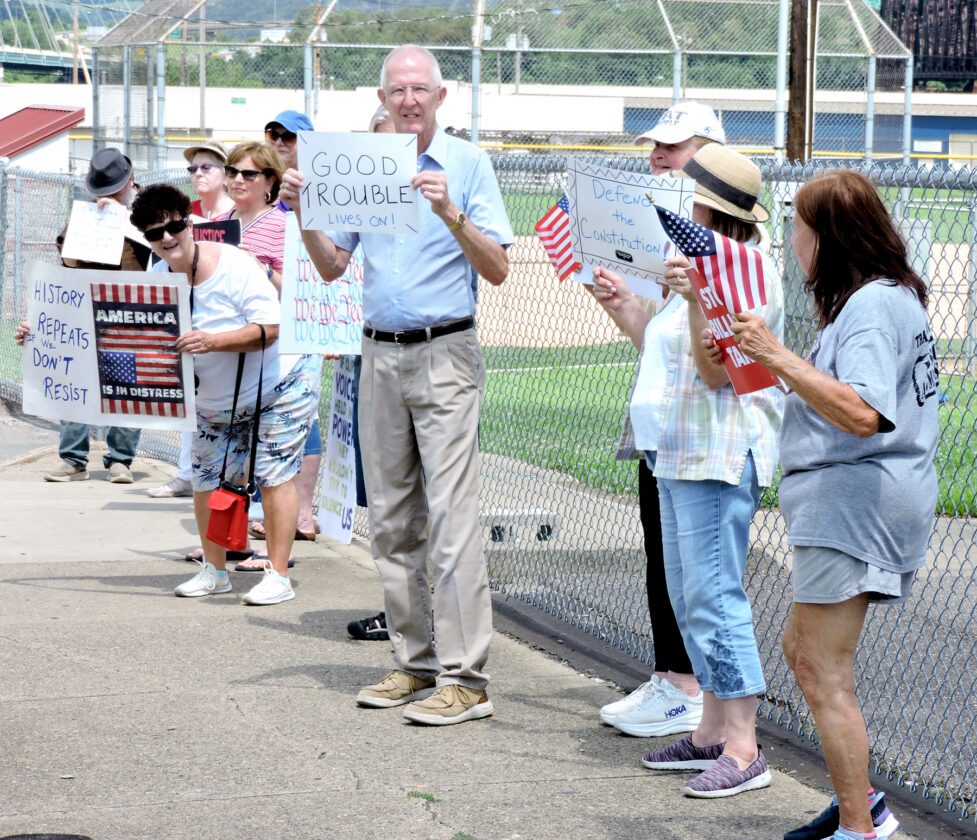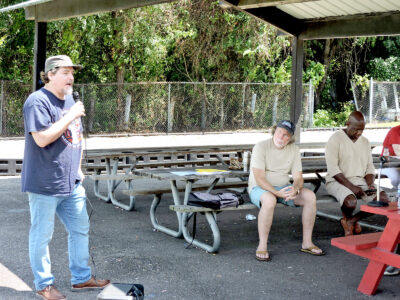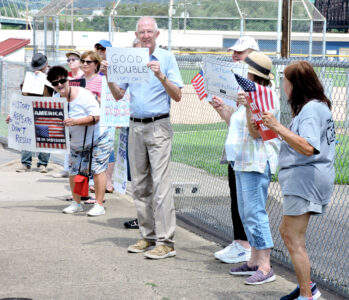Opposition to Trump policies voiced at rally
- VOICES ENCOURAGED — Michael Kripchak, a Democratic candidate last year for a seat representing Ohio in the U.S. House of Representatives, told participants of a Good Trouble rally held Sunday at Steubenville’s North End Park they must speak out against injustices he said are being committed by the Trump administration while being compassionate to those who have been affected. — Warren Scott
- PROTEST HELD — On Sunday afternoon, a group of protesters stood in front of Steubenville’s North End Park, where a rally was held to express opposition to Trump administration policies involving voting, law enforcement and other issues. It was one of many Good Trouble rallies held around the nation and inspired by late Congressman and civil rights advocate John R. Lewis. — Warren Scott

VOICES ENCOURAGED — Michael Kripchak, a Democratic candidate last year for a seat representing Ohio in the U.S. House of Representatives, told participants of a Good Trouble rally held Sunday at Steubenville’s North End Park they must speak out against injustices he said are being committed by the Trump administration while being compassionate to those who have been affected. -- Warren Scott
STEUBENVILLE — Opposition to Trump administration policies involving voting, law enforcement and other issues were expressed at a rally held Sunday afternoon at the North End Park.
Attended by about 20 people, it was one of many Good Trouble rallies held throughout the U.S. around the fifth anniversary of the death of Congressman and civil rights activist John R. Lewis.
One of the key leaders in the civil rights movement of the 1960s, Lewis once said Rosa Parks, refusing to sit in the segregated section of a public bus, “inspired us to get in trouble. And I’ve been getting in trouble ever since. She inspired us to find a way, to get in the way, to get in what I call good trouble, necessary trouble.”
At the local rally and others, protesters voiced objection to the S.A.V.E. Act, a bill passed by the U.S. Senate and pending in the U.S. House of Representatives that would require documentation of U.S. citizenship.
Such documentation would include birth certificates, U.S. passports and versions of the Real ID driver licenses, when registering to vote.

PROTEST HELD — On Sunday afternoon, a group of protesters stood in front of Steubenville’s North End Park, where a rally was held to express opposition to Trump administration policies involving voting, law enforcement and other issues. It was one of many Good Trouble rallies held around the nation and inspired by late Congressman and civil rights advocate John R. Lewis. -- Warren Scott
The bill states those who register to vote by mail may not vote for candidates in a federal race unless they present such documentation in person.
Supporters argue it would prevent voter fraud, ensuring only U.S. citizens vote in an election.
Some opponents have said it unnecessarily complicates registration for local voting officials because millions of women and men don’t have a last name that matches their birth certificates.
But Steubenville 4th Ward Councilman Royal Mayo was among speakers Sunday who suggested the move is intended to keep minority voters from the polls.
Mayo said it’s difficult for people to believe the separation of blacks from whites included not only schools and public restrooms but also parks and public swimming pools and even, post-segregation, to the number of blacks who would be admitted to a school choir.
“These are the kind of things voting can change and that’s why President Trump wants to roll back the voting,” he said.
Mayo also questioned cuts to federal programs such as the school lunch program, through which schools with low-income students accounting for at least 25 percent of enrollment may provide free lunches and breakfasts for all.
There’s a proposal to raise that percentage from 25 to 60, which according to the School Nutrition Association, would remove about 12 million students in more than 24,000 schools from the program.
Mayo said many local schools remain open on winter days to allow such students to receive the lunches.
“In a nation like this, how do we take away things from the least of these?” he said.
He said opponents to such policies must look to the determination displayed by the many who participated in the Civil Rights Movement.
Mayo also encouraged attendees to choose their public officials carefully.
“When you vote in somebody, vote for somebody who thinks like you,” he said, adding that person may be of a different color.
Richard Oliveto, who co-organized the local rally with Marjie DeFede, raised concerns about a move by the U.S. Department of Justice away from the investigation and enforcement of consent decrees for local police departments accused of misconduct.
Oliveto said as an attorney, he was involved with a case that led in 1997 to the Steubenville Police Department complying with an eight-year consent decree.
He noted the case was followed by consent decrees for police departments in other, larger cities.
And while Oliveto stressed it was spurred by misconduct by past police officials, not the present department, he said the current policy has halted ongoing investigations of others.
He said such investigations aren’t spurred by isolated incidents and involve a look at patterns of activity at least five years prior.
“Nobody wants to do away with the police,” said Oliveto, who added such federal actions help to set new standards for police conduct.
“I’m really bothered by the present administration reversing course when it was going in the right direction. It’s really disturbing to the civil rights fabric of this country,” he said.
Michael Kripchak, a retired police officer who ran unsuccessfully for a seat in the House of Representatives representing Ohio, said one answer to the protesters’ grievances, is to vote for new representation in the next election.
But he said some, including illegal immigrants being arrested by agents of U.S. Immigration and Customs Enforcement, can’t wait until then.
Kripchak said citizens must make their voices heard.
He also encouraged protesters to be compassionate toward those who have been negatively impacted by new policies, even when they are people who had supported the current administration.
“Once people start waking up, we need to be there for them,” said Kripchak, who added, “It’s about looking at those who hate you with love.”
Another speaker, J. David Core, urged attendees and other protesters to be more vocal.
“For goodness sake, stop with the hushed tones,” he said.




